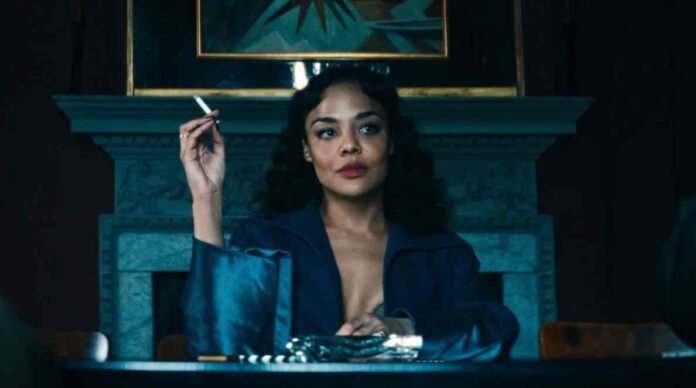- Hedda is a modern adaptation of Henrik Ibsen’s Hedda Gabler, directed by Nia DaCosta and starring Tessa Thompson.
- The film reimagines key characters, introducing gender-swapped roles and a same-sex love triangle.
- Cast members Imogen Poots and Nina Hoss discuss the balance between reinvention and the need for new stories.
- The movie raises questions about whether audiences focus too much on representation instead of storytelling depth.
Prime Video’s new film Hedda has sparked plenty of conversation since its theatrical release on October 24 and streaming debut on October 29. Directed by Nia DaCosta and starring Tessa Thompson, this reimagining of Henrik Ibsen’s Hedda Gabler mixes modern chaos with old-world complexity.
Set during one wild and intoxicating party, Hedda follows Thompson’s character as she tries to secure her husband George a coveted promotion. The night spirals into a storm of manipulation, passion, and consequence. Between drinks, drugs, and dangerous secrets, the film unravels like a modern fable on identity and power.
More Than a Party Gone Wrong
At first glance, Hedda feels like a stylish and scandalous drama. Think of an extravagant soirée filled with ambition, betrayal, and forbidden desire. Yet underneath the glitz lies something deeper.
DaCosta’s vision replaces Ibsen’s original male rival with Eileen, played by Nina Hoss, turning the story into a complex love triangle between Hedda, Eileen, and Thea, portrayed by Imogen Poots. The film’s gender-swapped characters and a non-white lead bring new layers to the century-old story.
As a queer woman, I was drawn to those details immediately. Representation in cinema still matters deeply. But as I reflected on Hedda, I began to wonder whether audiences sometimes focus on surface-level changes more than the story’s emotional truth.
When Representation Becomes the Headline
In an interview with The Independent, Tessa Thompson said something that stuck with me. “I feel hesitant sometimes to politicize any of these things,” she said. “But then I realize things end up being politicized just by virtue of what you look like or who you are.”
That quote lingers. It reminds us how easily art becomes a battleground for identity politics, even when the artist’s intent is more personal. DaCosta’s Hedda is not trying to preach. It simply reflects a modern world where identity and perception shape everything.
But maybe we, as viewers, have become too focused on what we see instead of why we see it. When we celebrate representation alone, we risk missing the emotional core of the story—the pain, the loneliness, the hunger for control that defines Hedda’s world.
The Cast Reflects on Reinvention
When I asked Imogen Poots and Nina Hoss about this tension, both actors paused before responding. “What a question,” Poots said with a smile, acknowledging how layered the topic is.
“I think it matters to reinvent something,” Poots continued. “That’s really cool, especially when the writing is strong enough. Ibsen’s ideas are still so relatable. They speak to the human experience.”
Hoss nodded in agreement, but Poots took the thought further. “At the same time, there’s so much talk about making old franchises progressive just by changing the protagonist’s gender,” she said. “Why not write something new and great for a woman? That would be really cool, too.”
Her words cut to the heart of Hollywood’s creative dilemma. Reinvention is powerful, but originality is what drives storytelling forward. “There are so many brilliant writers out there,” Poots added. “We should take more risks with original ideas instead of reworking old ones.”
Nina Hoss, who plays Eileen, offered her own reflection. “Eileen is now added to the canon of great female characters,” she said. “She’s there for anyone to grab now.” It’s a thought that perfectly captures how adaptation, when done right, doesn’t erase the past—it expands it.
A Film That Asks the Hard Questions
Hedda leaves a lasting mark because it doesn’t hand us easy answers. It asks viewers to look inward and question how much we prioritize representation over narrative. It also celebrates the power of reinvention without ignoring the value of fresh creation.
DaCosta’s direction fills every scene with tension and beauty, while Thompson commands attention as a woman trapped between desire and despair. The party at the heart of Hedda may descend into chaos, but the film’s message feels sharply controlled.
In an age where social media and AI often dull critical thinking, Hedda challenges us to stay awake as viewers. It reminds us that art is meant to provoke thought, not just provide representation or aesthetic pleasure.
If another version of Ibsen’s play had to exist, it’s hard to imagine a more daring or relevant one than this. Hedda is both entertaining and unsettling, leaving audiences with more to think about long after the credits roll.
Follow TechBSB For More Updates

